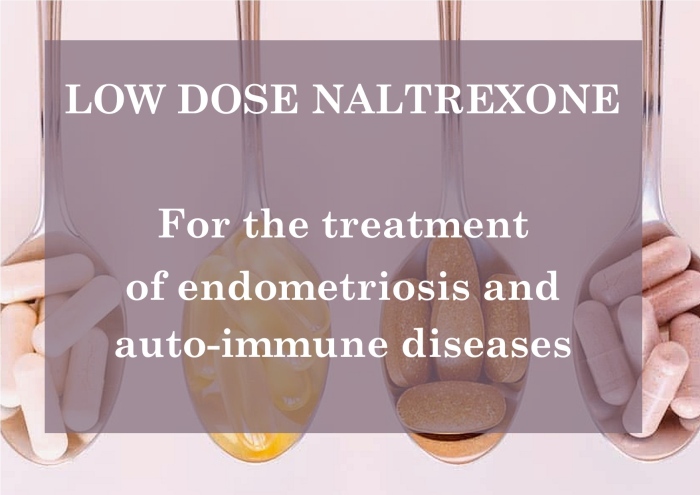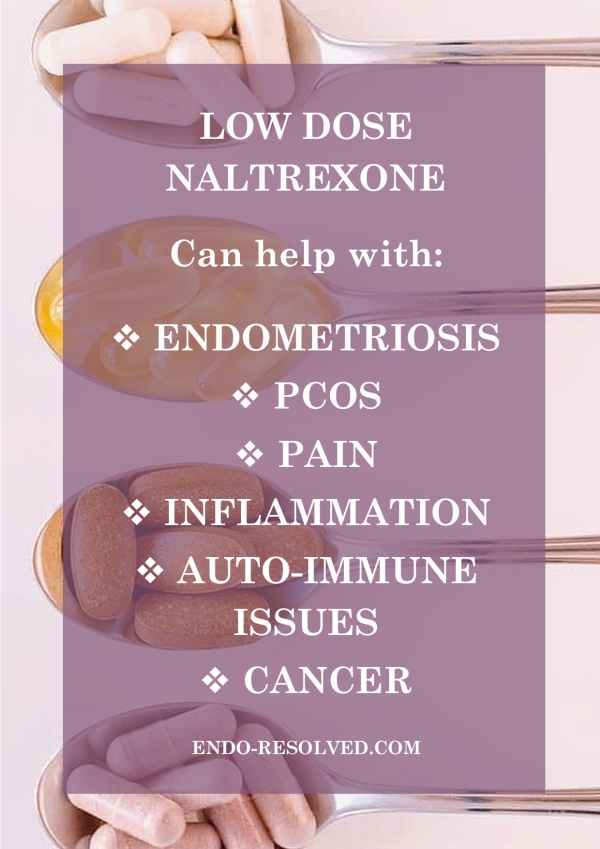Low Dose Naltrexone (LDN) for endometriosis
Low dose naltrexone has great promise to help with endometriosis and infertility

Low dose naltrexone is sometimes used to treat various auto-immune diseases and certain cancers with great success. Many women with endometriosis also suffer from a number of different auto-immune diseases and therefore low dose naltrexone is gaining ground as an option to treat endometriosis.
Naltrexone at Low Doses
Naltrexone is type drug called an “opiate antagonist”, meaning it blocks opioid receptors. Opioid receptors are related to pain, pleasure and endorphins. Taken in low doses LDN blocks opioid receptors only for a couple of hours. During this brief time, a “rebound effect” occurs in which there is an increased production and utilisation of endorphins and opioid receptors.
Put simply, low-dose naltrexone is blocking the cells and pathways that play a role in inflammation and, consequently, pain. Also Low-Dose Naltrexone (LDN) may be able to restore endorphin production in people who suffer from ongoing fatigue, depression, anxiety, and have a history of endometriosis, PCOS, or autoimmune disorders.
More incredibly, LDN is showing improvements in people with cancer, neuro-degenerative conditions, autoimmune conditions, and mental health conditions
What conditions can LDN Help?
- Under-active thyroid
- Endometriosis
- Infertility
- Cancer
- Auto-immune diseases
- Chronic fatigue
- Fibromyalgia
- Anxiety
This interview HERE with Dr. Phil Boyle Director of the NaPro Fertility Care Clinic in Dublin discusses the benefits that can be found using LDN for infertility, auto-immune diseases and endometriosis.
"By using LDN in women who have endometriosis, we've observed a lower incidence of miscarriage and better, healthier pregnancies for women who continue using it during pregnancy. So that's the immediate reason for using LDN. But there may be an even greater impact in the form of positively affecting the health of future generations of women as well."
In one study, it was found that women with PCOS that were given LDN had success with the following symptoms:
- Lost weight
- Insulin resistance decreased
- Blood levels of free testosterone, dehydroepiandrosterone sulfate, cortisol, and androstenedione decreased significantly.
- Periods improved in 80% of the women
- The fasting glucose-to-insulin ratio improved in those with insulin resistance
LDN helps women with endometriosis
Endometriosis is related to imbalances in your hormones but one aspect that is often ignored is that it is also related to the immune system and inflammation. Endometriosis has been shown to have similarities with various other autoimmune diseases by also presenting with elevation in inflammatory markers, cell-mediated abnormalities, anti-bodies against itself and elevation of other blood markers.
How Is LDN Dosed
LDN is started at a super ultra low dose anywhere between 0.5mg to 1.5mg at night-time. If you are doing well, without side effects then your dose is very slowly increased. Dose adjustment occurs over 4 to 8 weeks until you feel stable. Most people will have symptom controlled at a daily dose of anywhere between 3mg to 5mg
Side effects
There may be some sleep disturbance at first but this soon wears off. Sometimes headaches and vivid dreams can occur, but these side effects will also decrease with time.
Note* You cannot mix low dose naltrexone with opioid drugs like codeine or morphine. Both codeine and morphine are opioids and if you mix Naltrexone with either of these medications, one may become very sick with persistent vomiting.
You can read more about Low Dose Naltrexone HERE at the LDN Research Trust.
Reference:
Berlau, D. J., Patten, D. K., & Schultz, B. G. (2018). The Safety and Efficacy of Low‐Dose Naltrexone in the Management of Chronic Pain and Inflammation in Multiple Sclerosis, Fibromyalgia, Crohn’s Disease, and Other Chronic Pain Disorders. Pharmacotherapy: The Journal of Human Pharmacology and Drug Therapy, 38(3), 382-389. https://doi.org/10.1002/phar.2086
Interview with Dr. Phil Boyle, Director of the NaPro Fertility Care Clinic in Dublin, Ireland. (2016). Retrieved from https://www.ldnscience.org/resources/interviews/interview-phil-boyle
Eisenberg, VH, Zolit, M, Soriano, D. (2012) Is there an association between autoimmunity and enodmetriosis? Autoimmunity Reviews, 11(11), 806-14.
Ahmed MI, Duleba AJ, El shahat O et al. (2008). Naltrexone treatment in clomiphene resistant women with polycystic ovary syndrome. Hum Reprod, 23(11), 2564-9.
https://clinicaltrials.gov/ct2/show/NCT03970330
https://www.ldnscience.org/patients/clinical-trials-in-progress

About the Author
Hi, I am Carolyn Levett, the Founder here at endo-resolved - I am an Integrative Health Coach having studied nutrition, naturopathy and aromatherapy as well as being a published author of three endometriosis books. I used to suffer from severe endometriosis and was fortunate to be able to regained my health and recover from this disease with the support of nutrition, natural therapies and lots of determination.
My motivation is to help other women with endometriosis to heal their bodies so they may start to overcome this awful disease without having to totally rely on toxic drugs and surgeries which can cause further damage - with healing thoughts, Carolyn.
 As featured in:
As featured in:





